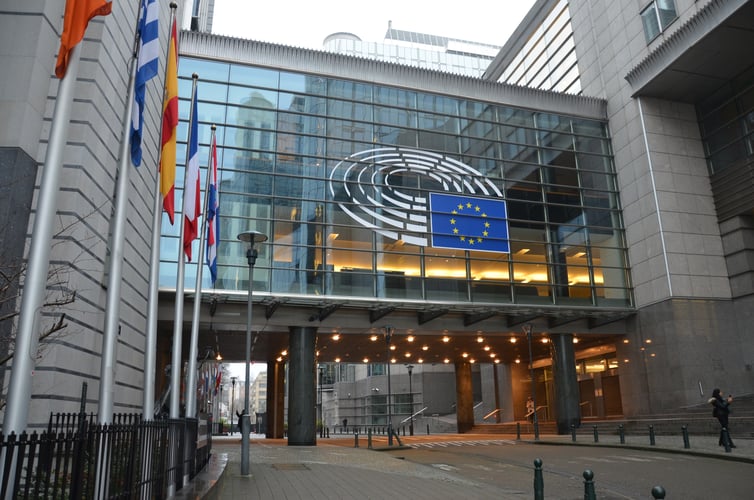

📌The European Union Deforestation Regulation (EUDR) raises many practical questions for businesses operating within the EU. ESG expert Yoeri Buis, answers the most frequently asked questions in this article to help you navigate your responsibilities and prepare for compliance.
Last updated: December 2025
Am I subject to the EUDR?
The EUDR applies to anyone who imports, exports, produces, or trades selected commodities (such as soy, cocoa, cattle, wood, coffee, palm oil, rubber, and derived products) within the EU for commercial purposes. Both large and small businesses fall under the EUDR.
Am I an operator or a trader?
The EUDR distinguishes between “operators” and “traders.” You are an operator if you place products or commodities on the EU market for the first time or export them. Traders only deal in products that have already been imported or produced. Operators are subject to stricter due diligence requirements than traders.
What is the difference between an upstream operator and a downstream operator?
An upstream operator is an entity that places EUDR regulated products or commodities on the EU market for the first time or exports them.
A downstream operator is a company that takes regulated commodities or products already subject to an earlier due diligence statement, transforms or processes them into new in-scope products, and places them on the EU market or exports them.
When does the EUDR apply to my business?
Following a period of consultation, the European Commission established a new timeline in December 2025. After a delay period, the first wave of the EUDR will enter into force by the end of 2026.
Applying in December 2026 to medium-sized and large companies and in June 2027 to micro and small companies.
Who conducts audits and how are they assessed?
The Netherlands Food and Consumer Product Safety Authority (NVWA) oversees compliance with the EUDR in the Netherlands. Outside the Netherlands, EUDR compliance is assessed by each country's appointed authority. During inspections, authorities will assess whether legal requirements such as the due diligence system and reporting obligations are being met. Inspections can occur without notice and include document review, traceability, and risk assessments.
What are the penalties?
Violations of the EUDR may lead to fines of up to 4% of the company’s EU annual turnover from the previous year. In addition to monetary penalties, authorities may seize goods, impose temporary trading bans, or exclude companies from public procurement.
What administrative obligations apply to small and micro businesses?
Small/micro businesses as operators:
You must conduct full due diligence before placing relevant products on the EU market or exporting them, just like larger companies. This includes collecting geolocation data (at least one GPS coordinate per plot), harvest or production dates, official documentation from the country of origin, and risk assessment reports.
You must submit a due diligence statement (DDS) to the central EU system before placing the product on the market. All required documentation (DDS, evidence, risk assessments, supplier information) must be retained for at least five years and be available for inspection upon request.
Small/micro businesses as traders:
You are not required to perform your own due diligence or submit a DDS, provided the product is already covered by an operator’s DDS. However, you must retain relevant documentation proving that the products you trade are compliant, including a reference to the operator’s DDS.
These documents must be stored for five years and be readily available during audits or inspections.
List of EUDR HS Codes - Which products and commodities fall under the EUDR?
|
Relevant commodity |
Relevant products |
|
Cattle |
0102 21 , 0102 29 - Live cattle ex 0201 - Meat of cattle, fresh or chilled ex 0202 - Meat of cattle, frozen ex 0206 10 - Edible offal of cattle, fresh or chilled ex 0206 22 - Edible cattle livers, frozen ex 0206 29 - Edible cattle offal (excluding tongues and livers), frozen ex 1602 50 - Other prepared or preserved meat, meat offal, blood, of cattle ex 4101 - Raw hides and skins of cattle (fresh, or salted, dried, limed, pickled or otherwise preserved, but not tanned, parchment-dressed or further prepared), whether or not dehaired or split ex 4104 - Tanned or crust hides and skins of cattle, without hair on, whether or not split, but not further prepared ex 4107 - Leather of cattle, further prepared after tanning or crusting, including parchment-dressed leather, without hair on, whether or not split, other than leather of heading 4114 |
|
Cocoa |
1801 - Cocoa beans, whole or broken, raw or roasted 1802 - Cocoa shells, husks, skins and other cocoa waste 1803 - Cocoa paste, whether or not defatted 1804 - Cocoa butter, fat and oil 1805 - Cocoa powder, not containing added sugar or other sweetening matter 1806 - Chocolate and other food preparations containing cocoa |
|
Coffee |
0901 - Coffee, whether or not roasted or decaffeinated; coffee husks and skins; coffee substitutes containing coffee in any proportion |
|
Oil palm |
1207 10 - Palm nuts and kernels 1511 - Palm oil and its fractions, whether or not refined, but not chemically modified 1513 21 - Crude palm kernel and babassu oil and fractions thereof, whether or not refined, but not chemically modified 1513 29 - Palm kernel and babassu oil and their fractions, whether or not refined, but not chemically modified (excluding crude oil) 2306 60 - Oilcake and other solid residues of palm nuts or kernels, whether or not ground or in the form of pellets, resulting from the extraction of palm nut or kernel fats or oils ex 2905 45 - Glycerol, with a purity of 95 % or more (calculated on the weight of the dry product) 2915 70 - Palmitic acid, stearic acid, their salts and esters 2915 90 - Saturated acyclic monocarboxylic acids, their anhydrides, halides, peroxides and peroxyacids; their halogenated, sulphonated, nitrated or nitrosated derivatives (excluding formic acid, acetic acid, mono-, di- or trichloroacetic acids, propionic acid, butanoic acids, pentanoic acids, palmitic acid, stearic acid, their salts and esters, and acetic anhydride) 3823 11 - Stearic acid, industrial 3823 12 - Oleic acid, industrial 3823 19 - Industrial monocarboxylic fatty acids; acid oils from refining (excluding stearic acid, oleic acid and tall oil fatty acids) 3823 70 - Industrial fatty alcohols |
|
Rubber |
4001 - Natural rubber, balata, gutta-percha, guayule, chicle and similar natural gums, in primary forms or in plates, sheets or strip ex 4005 - Compounded rubber, unvulcanised, in primary forms or in plates, sheets or strip ex 4006 - Unvulcanised rubber in other forms (e.g. rods, tubes and profile shapes) and articles (e.g. discs and rings) ex 4007 - Vulcanised rubber thread and cord ex 4008 - Plates, sheets, strips, rods and profile shapes, of vulcanised rubber other than hard rubber ex 4010 - Conveyer or transmission belts or belting, of vulcanised rubber ex 4011 - New pneumatic tyres, of rubber ex 4012 - Retreaded or used pneumatic tyres of rubber; solid or cushion tyres, tyre treads and tyre flaps, of rubber ex 4013 - Inner tubes, of rubber ex 4015 - Articles of apparel and clothing accessories (including gloves, mittens and mitts), for all purposes, of vulcanised rubber other than hard rubber ex 4016 - Other articles of vulcanised rubber other than hard rubber, not elsewhere specified in chapter 40 ex 4017 - Hard rubber (e.g. ebonite) in all forms including waste and scrap; articles of hard rubber |
|
Soya |
1201 - Soya beans, whether or not broken 1208 10 - Soya bean flour and meal 1507 -Soya-bean oil and its fractions, whether or not refined, but not chemically modified 2304 - Oilcake and other solid residues, whether or not ground or in the form of pellets, resulting from the extraction of soya-bean oil |
|
Wood |
4401 - Fuel wood, in logs, in billets, in twigs, in faggots or in similar forms; wood in chips or particles; sawdust and wood waste and scrap, whether or not agglomerated in logs, briquettes, pellets or similar forms 4402 -Wood charcoal (including shell or nut charcoal), whether or not agglomerated 4403 - Wood in the rough, whether or not stripped of bark or sapwood, or roughly squared 4404 - Hoopwood; split poles; piles, pickets and stakes of wood, pointed but not sawn lengthwise; wooden sticks, roughly trimmed but not turned, bent or otherwise worked, suitable for the manufacture of walking sticks, umbrellas, tool handles or the like; chipwood and the like 4405 -Wood wool; wood flour 4406 - Railway or tramway sleepers (cross-ties) of wood 4407 - Wood sawn or chipped lengthwise, sliced or peeled, whether or not planed, sanded or end-jointed, of a thickness exceeding 6 mm 4408 - Sheets for veneering (including those obtained by slicing laminated wood), for plywood or for other similar laminated wood and other wood, sawn lengthwise, sliced or peeled, whether or not planed, sanded, spliced or end-jointed, of a thickness not exceeding 6 mm 4409 - Wood (including strips and friezes for parquet flooring, not assembled) continuously shaped (tongued, grooved, rebated, chamfered, V-jointed, beaded, moulded, rounded or the like) along any of its edges, ends or faces, whether or not planed, sanded or end-jointed 4410 - Particle board, oriented strand board (OSB) and similar board (for example, waferboard) of wood or other ligneous materials, whether or not agglomerated with resins or other organic binding substances 4411 - Fibreboard of wood or other ligneous materials, whether or not bonded with resins or other organic substances 4412 - Plywood, veneered panels and similar laminated wood 4413 - Densified wood, in blocks, plates, strips or profile shapes 4414 - Wooden frames for paintings, photographs, mirrors or similar objects 4415 - Packing cases, boxes, crates, drums and similar packings, of wood; cable-drums of wood; pallets, box pallets and other load boards, of wood; pallet collars of wood (not including packing material used exclusively as packing material to support, protect or carry another product placed on the market) 4416 - Casks, barrels, vats, tubs and other coopers’ products and parts thereof, of wood, including staves 4417 - Tools, tool bodies, tool handles, broom or brush bodies and handles, of wood; boot or shoe lasts and trees, of wood 4418 - Builders’ joinery and carpentry of wood, including cellular wood panels, assembled flooring panels, shingles and shakes 4419 - Tableware and kitchenware, of wood 4420 - Wood marquetry and inlaid wood; caskets and cases for jewellery or cutlery, and similar articles, of wood; statuettes and other ornaments, of wood; wooden articles of furniture not falling in Chapter 94 4421 - Other articles of wood Pulp and paper of Chapters 47 and 48 of the Combined Nomenclature, with the exception of bamboo-based and recovered (waste and scrap) products ex 49 - Printed books, newspapers, pictures and other products of the printing industry, manuscripts, typescripts and plans, of paper ex 9401 - Seats (other than those of heading 9402 ), whether or not convertible into beds, and parts thereof, of wood 9403 30 , 9403 40 , 9403 50 , 9403 60 and 9403 91 - Wooden furniture, and parts thereof 9406 10 - Prefabricated buildings of wood |
A practical and effective way to manage EUDR
All businesses (including small or micro) must be able to demonstrate compliance, even during unannounced audits (e.g., by the NVWA).
Although small and micro businesses have a later compliance deadline (30 June 2026 for existing businesses), the obligations themselves are not lighter than those for larger companies—only timelines and sometimes administrative burdens are slightly reduced.
A practical and effective way to manage EUDR compliance is by using a dedicated digital solution. Such a platform centralises your due diligence data, automates traceability checks, and keeps your documentation audit-ready—saving time while reducing the risk of errors.
Discover how our EUDR compliance platform works and see how it can streamline your path to compliance:




